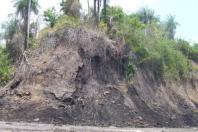Report on Moroccan Oil, including Oil Shale
Morocco seeks to boost oil and gas exploration
According to the general director of the National Office of Hydrocarbons and Mines (ONHYM), Amina Benkhadra, all conditions are met in Morocco to establish a viable petroleum system. Here is an overview on the explorations.
In the wake of the first Moroccan oil and gas summit organized by ONHYM in early May in Marrakech, Benkhadra spoke about oil exploration in Morocco. She is very familiar with the sector and is the number-one contact for oil companies wishing to operate in Morocco. Convinced of the potential of Moroccan subsoil, Benkhadra believes that investments made in this sector are encouraging and we must keep up the pace of progress to hope for good news.
TelQuel: Since 1956, more than 300 wells have been drilled in Morocco, but nothing has ever been found. Why is there this craze for oil that has been going on over the last three years?
Benkhadra: Explorations in Morocco actually began in 1912. However, this activity was not regular but rather followed a back-and-forth pattern. Currently, we have scientific information confirming that Morocco has favorable geology and sedimentary basins that have potential but are underexplored from the geoscientific perspective. All these elements suggest that there may be a functioning oil system.
TelQuel: What can you tell us about the latest gas discovery in Sidi Mokhtar?
Benkhadra: To be more precise, it is not a discovery. These are only encouraging signs for further exploration in this zone through a 3-D seismic acquisition and the drilling of additional wells.
TelQuel: Several drilling operations were recently undertaken, requiring a significant investment. Is it enough?
Benkhadra: Overall, the investment is not sufficient in relation to the extent of the available sedimentary basins. Although we began [exploration operations] in 1912, the current well density in Morocco remains very low. There is a density of 0.04 wells per 100,000 square kilometers [38,610 square miles], compared to the global average of 10 wells per 100,000 square kilometers. We are currently going through an important stage in terms of investment works and drilling operations, and we must maintain these activities to be able to make new discoveries.
TelQuel: How are licenses granted to oil companies?
Benkhadra: We offer two types of contracts. The first is a reconnaissance license for an initial period of one renewable year. The second is a prospecting license extending over a period of eight years. Therefore, it all depends on the zone chosen by the partner. When the zone is not sufficiently explored, we would rather grant a reconnaissance license to conduct relevant studies. The exploration license will be granted once ONHYM obtains sufficient data on the zone.
TelQuel: When does ONHYM intervene?
Benkhadra: The hydrocarbon law entrusts ONHYM to prepare and negotiate agreements. Moreover, our national office is in charge of geological studies, and looks for potential partners. In this respect, our teams are on the move at all oil events around the world. They even organize door-to-door campaigns targeting companies to explain and present geological information about the various basins.
TelQuel: What about the role of the concerned ministry?
Benkhadrda: Once ONHYM prepares the contract and its various aspects, the said contract shall be submitted to the Ministry of Energy and Ministry of Finance for approval.
TelQuel: Why does it have to be submitted to the Ministry of Finance?
Benkhadra: Exploration companies receive special treatment from the tax authorities. They enjoy exemptions from customs duties and VAT during the exploration phase. Should the exploration generate good results, the law provides for a tax exemption for the first 10 years.
TelQuel: Could the failure of Tarfaya Offshore Block drilling operations operated by Cairn Energy demotivate other explorers?
Benkhadra: In the case of Cairn Energy, it is primarily a question of oil operability and profitability. Following the drilling, the company is currently assessing the entire region. Tradespersons know it best; oil exploration is an extremely risky business, requiring much time and patience. Our partners, always present in Morocco, continue to work with confidence, and the fact that the survey findings are not up to our expectations does not prevent them from fulfilling their commitments.
TelQuel: Some oil reserves are located in the south of Morocco. Can the economic and political problems of the region impact the explorers’ appetite?
Benkhadra: In the exploration field, all of Morocco’s operations, from the north to south, are legal. Regarding the southern provinces, our position is clear; explorations are legally conducted. A UN legal adviser has confirmed this and indicated that in case of development and production, it is necessary that local people reap the benefits. We are currently in the process of clarifying the method of management of the southern areas.
TelQuel: The hydrocarbon law allows drilling companies 75% of the proceeds [made from discoveries], while 25% of these proceeds revert to the Moroccan state. How do you explain this imbalance?
Benkhadra: Morocco is considered a frontier zone, i.e., an area where there has not been a large oil discovery yet. Moreover, we compete with other countries, and each imposes its conditions. In the past, 51% of proceeds were allocated to the state but this did not help us attract investors. We currently offer conditions that are deemed the most attractive in the world to increase our chances of discovery.
TelQuel: During the summit, you said that Morocco has oil shale reserves amounting to around 50 billion barrels. What can be done with these reserves?
Benkhadra: We have known since 1980 that Moroccan soil contains 50 billion barrels of oil shale, which places us in the sixth position worldwide. The problem and difficulty in exploiting this type of rock remains of a technological order. Estonia is the only country that has managed to produce electricity from oil shale, but this is very harmful for the environment. There are semi-industrial pilot processes that produce a bit of oil and gas, but no industrial process has been developed. Numerous companies are working in this direction and we are discussing with them the testing of these processes in the basins of Tarfaya and Timahdite.


